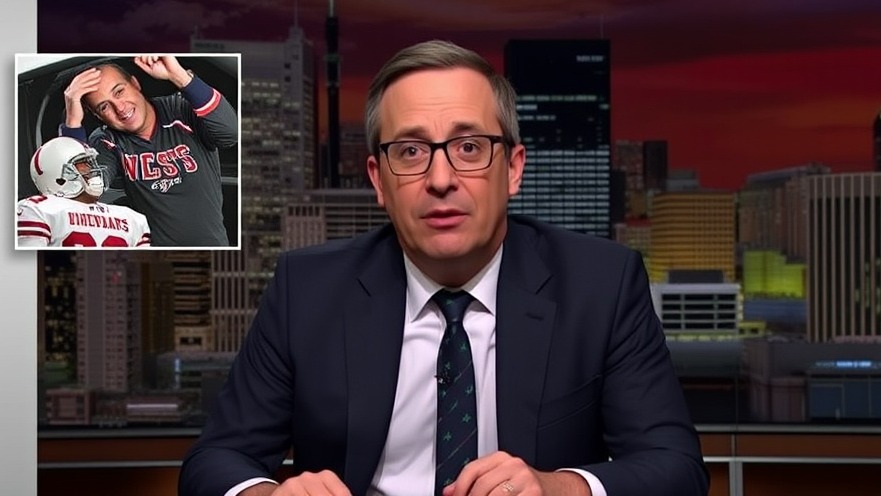
John Oliver's Scathing Take on Sports Betting's Rise
In his latest segment on Last Week Tonight, John Oliver took a bold stance against the increasingly pervasive sports betting industry in the United States, highlighting the troubling implications tied to its expansion. The flood of gambling advertisements permeating television screens across the nation has sparked concern among many viewers. As Oliver astutely noted, “You’re not crazy for thinking those ads are inescapable.” With a staggering $434 million generated in just one year, the industry is ripe with financial opportunities, yet the social costs are becoming alarmingly apparent.
A Double-Edged Sword: The Wins and Losses of Sports Betting
Oliver emphasized how betting can ignite intense engagement with sports, altering the nature of fan interaction. He pointed out that “people will always be more engaged if they have a personal vested interest in what they’re watching”—a sentiment echoed by the substantial financial gains sports leagues have reaped. The NFL alone garnered $132 million in gambling-related sponsorships last year. However, this transition into a betting-centric culture has also exacerbated personal hardships: studies indicate a disturbing 28% increase in bankruptcies in states that have legalized sports betting since the Supreme Court ruling in 2018.
The Hidden Dangers: Gambling Addiction and Online Platforms
While advertisements often portray gambling as a thrilling pastime, Oliver shed light on the harrowing reality faced by many who fall prey to addiction. Shockingly, 1% of U.S. adults are reported to have severe gambling problems, while 2-3%—equating to nearly 10 million people—grapple with mild to moderate issues. This statistic raises a critical question: are companies doing enough to safeguard their consumers from the dangers of their offerings?
In what Oliver describes as a system designed to “reel gamblers in and keep them playing,” accessibility can lead to significant financial losses. With gambling apps now a click away, individuals can potentially wager uncontrollably. “Betting until all your money has gone can be scarily easy to do when the casino is literally inside your pocket,” he warned, underscoring the need for immediate reforms.
Regulatory Lapses and the Path Forward
Amidst the outcry for change, Oliver recognized existing regulations that aim to protect vulnerable individuals. However, he criticized their lack of enforcement, pointing to underutilized programs designed to help individuals block themselves from placing bets. He urged for regulations that would make it harder for underage individuals to get involved in betting and suggested comprehensive checks on promotional offers that entice people to get back to gambling.
Echoing the successes seen with tobacco advertising reforms, Oliver advocated for a similar crackdown on gambling ads which currently fill the airwaves and sports venues, propagating the dangers of betting culture. “We can change the trajectory here,” he stated, calling for an urgent reevaluation of advertising practices.
The Cultural Impact: Sports, Society, and Individual Responsibility
The cultural implications of gambling are profound. The relationships between sports teams and betting companies can blur ethical lines, leaving fans at risk of financial despair—a sentiment that Oliver articulated poignantly. The encouraging engagement through betting presents a double-edged sword; while it can spice up interest in the sport, it also opens doors to addiction and financial peril.
As digital nomads increasingly travel and explore new cultures, being mindful of the gambling landscape in various destinations becomes crucial. The growing normalization of gambling through sports betting signals a societal shift that warrants reflection on not just personal habits but the collective responsibility we share for each other's wellbeing.
Seeking Solutions: A Call to Action
Beyond mere awareness lies the need for actionable insights. Individuals affected by gambling addiction should seek support networks and advocacy that aim to challenge the existing norms. As Oliver encouraged, “the betting industry should take responsibility for the hazards intertwined with their profits,” and so should we as consumers and citizens.
As we move forward, it’s essential to engage critically with the narratives perpetuated by gambling advertisements. By scrutinizing these practices and advocating for change, we can encourage a sports environment that prioritizes health and responsibility over profit. Together, we can ensure that sports remain an enjoyable pastime—rather than a perilous gamble.
With the developments in this sector continually evolving, remaining informed and taking action is key. Let's challenge ourselves to speak up against harmful practices.
 Add Row
Add Row  Add
Add 




Write A Comment